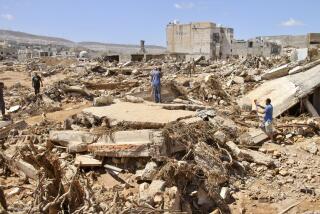Libyan People Seem Ready to Resolve Lockerbie Case
- Share via
TRIPOLI, Libya — Perched on a fence above this city’s seafront, with nothing better to do all day than watch cars go by, the jobless man showed no hesitation when asked whether his government should surrender two suspects wanted in the bombing 10 years ago of Pan Am Flight 103.
“The Lockerbie case should be resolved, and those two men should be extradited,” said Khaled Sadq, 31, a university graduate who said he is still unmarried because he cannot find work that would enable him to support a spouse.
Although many in the West remain highly skeptical of the intentions of Libyan leader Moammar Kadafi, a visit to the capital this weekend revealed signs that sentiment is building for turning over the two suspects who have been blamed by the United States and Britain for the terrorist bombing over the Scottish village of Lockerbie that killed 270 people.
“A solution to this crisis is within reach,” state-run Libyan Radio said Sunday, quoting an unidentified Foreign Ministry official one day after U.N. Secretary-General Kofi Annan’s visit to attempt to win the extraditions.
British Foreign Secretary Robin Cook was briefed by Annan about his talks with Libyan officials, including his tete-a-tete with the country’s supreme leader, Col. Kadafi. Based on Annan’s meetings, “I think you could sum up our mood as one of qualified optimism,” Cook said. Libya’s official news agency, Jana, was more cautious, however, saying it wouldn’t be “logical or reasonable” for the suspects to be transferred for trial in time for the 10th anniversary of the Dec. 21, 1988, bombing.
Although there are no certainties, the body language of the participants from both sides after the Annan visit seemed to be saying that a decision to hand over the terrorist suspects is near.
If so, the main reasons for Libya’s shift in sentiment, according to one Arab diplomat based in Tripoli, may be the nation’s troubled economy and a fatigue among Libyans with the six-year U.N. ban on air travel to and from the country.
“Everybody wants to solve the problem. It has been going on for too long,” the Arab diplomat said.
“Six or seven years ago, I would have said, ‘No, it is impossible’ ” for Libya to hand over the suspects, he said. But now, “everything has changed. The whole world has changed.”
The diplomat said he expects a decision to be made this week by the General People’s Congress, which Tuesday will begin the annual, nationally televised session at which members review the policies of various government ministries and grill high state officials. The meeting is scheduled to last five days, and Foreign Minister Omar Mustafa Muntasser hinted Saturday that the Lockerbie case will be prominent on the agenda.
Six years ago, the congress--a kind of parliament whose members are elected indirectly--made a vow that the suspects would never be turned over to the United States and Britain. So the diplomat said it is logical to assume that the congress will have to overrule that previous decision.
The U.N. sanctions against Libya--an arms and air embargo imposed in 1992 and expanded in 1993--have not stifled its economy in the same way that a ban on oil sales since 1990 has crippled Iraq. But they still have bite:
* Because of the sanctions, many foreign companies are hesitant to invest or enter into trade with Libya.
* The international flight ban means that Libyans--most of whom live on the 1,100-mile-long Mediterranean coastal plain--must travel long distances by road to Egypt or Tunisia, or sail 10 hours on a ferry from Tripoli to Malta, to reach the nearest airport to travel abroad. The ban is a special and sometimes dangerous hardship for people in need of medical treatment abroad.
* The civil aviation and tourism sectors barely function. Even domestic flights have been affected because of the difficulty of keeping Libyan Arab Airlines planes maintained without spare parts. Pilots, ground crews, air controllers and others in the airline and travel industries have lost their jobs.
In addition, Libya has been hit hard by this year’s sharp drop in world oil prices. The nation’s economy is almost totally dependent on oil. The drop in revenues is forcing the budgets of some government ministries to be cut by 25%, the diplomat said.
Despite all this, Libya remains a relatively rich country compared with its neighbors. Before the oil price drop, it was earning $8 billion a year in energy exports, mainly to Western Europe--not bad for a country with only 6 million people.
Still, the economy has not been producing jobs to keep pace with the number of workers coming of age each year. Officially, unemployment is put at 12%, but international organizations inside the country believe that the actual rate is much higher, a conclusion supported by the number of idle young men who can be seen on Tripoli’s streets.
Sadq was among about a dozen men in their 20s and early 30s passing the day Saturday leaning on a fence near the terminus for the Malta-bound ferry. “Life is emptiness,” he said.
“Yes, look at us,” added his friend Nouri, 28. “We’re standing here. We have nothing to do. In normal circumstances, we should have been married at 18. Instead, we have no marriage, no cars, nothing.”
Both blamed the faltering economy and the continuing sanctions for their unhappiness.
“We can have oil,” said Nouri, “but what we need is inner peace.”
More to Read
Sign up for Essential California
The most important California stories and recommendations in your inbox every morning.
You may occasionally receive promotional content from the Los Angeles Times.













